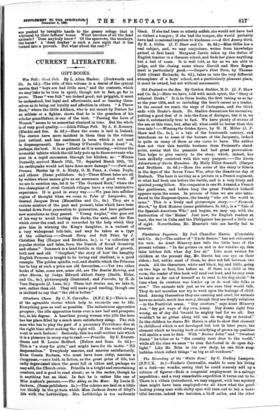°Herbert Chase. By C. N. Carvalho. (S.P.C.K.)—This is one of
the agreeable stories which help to reconcile one to life. Everything goes as well as possible. The industrious apprentice prospers ; the idle apprentice turns over a new leaf and prospers, too, in his degree. A heartless young woman who jilts the hero has herplace.filled by a much more satisfactory sister. The rich man who has to play the part of a pecuniary Providence dies at the right time after making the right will. If the world always went in such fashion ! Seriously, this is a well-written tale which it is a pleasure in every way to read.—Priscilla. By E. Everett- Green and H. Louise Bedford. (Nelson and Sons. 3s. 6d.)— This is "a story for girls," and might have for its motto "Nil desperandum." Everybody marries, and marries satisfactorily. Even Cousin Barbara, who must have been sixty, marries a clergyman,—once held, in fiction, as the great prize of life, but sadly depreciated since the great fall in tithes and, perhaps we may add, the .C1mrch crisis. Priscilla is a bright and entertaining creature, and is good to read about; so is the rector, though he is anything but an ideal. In fact he is rather like one of Miss Austenas parsons.—The Abbey on the Moor. By Lucie E. Jackson. ,(Same publishers. 2s.)—The colours are laid on a little too thickly in the.pilture which Miss ,JaCkson draws of Sibyl's life witli the Lethbridge.'. Mrs. Lethbridge is too uniformly black. If she had been so utterly selfish, she would not have had so violent a temper ; if she had the temper, she would probably have lad occasional impulses to kindness.—A Girl Among Girls. By E. A. Gillie. (J. F. Shaw and Co. 3s. 6d.)—Miss Gillie has a real subject, and, we may conjecture, writes from knowledge gained at first hand. Margaret Jarvis takes up the duties of English teacher in a German school, and finds her place anything but a bed of roses. It is well told, as far as we are able to judge, and the closing scene where Harold and Herr Regan • meet is particularly good.—Cooper's First Term, by Thomas Cobb (Grant Richards, 38. 6d.), takes us into the very different atmosphere of a boys' school, not a particularly pleasant place, it must be owned, but not without amusement.






















































 Previous page
Previous page